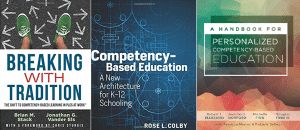Want to Become Competency-Based? Three Books to Light the Way
CompetencyWorks Blog
 This is the final article in the series Conversations with Authors About Competency-Based Education. Links to the entire series can be found at the bottom.
This is the final article in the series Conversations with Authors About Competency-Based Education. Links to the entire series can be found at the bottom.
Districts and schools are choosing different entry points for their path toward personalized, competency-based education. Remember, we aren’t referring to technologically driven solutions. When we say personalized, competency-based we are referring to drawing from the research on learning to create schools that strive to help students reach college and career readiness while discovering their passions and potential.
There is no one implementation guide on how to move forward, but thankfully there are three great books that can outline a number of the steps.
- Breaking with Tradition by Brian Stack and Jonathan Vander Els;
- Competency-Based Education: A New Architecture for K-12 Schooling by Rose Colby; and
- A Handbook for Competency-Based Education by Robert J. Marzano, Jennifer S. Norford, Michelle Finn, Douglas Finn III.
The transition from the traditional system to a modern system requires changes in underlying beliefs and culture, pedagogy, and instruction. It’s a big shift but not one that has to happen all at the same time. Each of these three books provide descriptions of the major implementation steps, although each with slightly different emphasis. Each is also chock full of insights and tips.
The only things that are either weak or missing from all three are what it means to create a culture of inclusivity and belonging (Principle #3 in Quality Principles for Competency-Based Education) and to be prepared to address equity issues that are likely to pop up if there isn’t a strong enough commitment to eradicating bias and institutional patterns of inequity (Principle #2). The field of competency-based education has been led by national organizations and intermediaries that are primarily white as well as districts that have primarily white staff. Although this is getting better with intentional efforts to strengthen the diversity of the field, we need to do better. We need to make sure that we are culturally respectful and responsive as well as academically responsive to students.
Read the Entire Series:
- Conversations with Authors About Competency-Based Education
- The One World Schoolhouse by Salman Khan (Part 1)
- Filling in the Gaps (Part 2)
- The Broken Model (Part 3)
- A Different Sort of Future for Education (Part 4)
- The Culture Code: Creating a Culture for Competency-Based Schools (Part 1)
- The Culture Code: Turning Connection into Cooperation in Competency-Based Schools (Part 2)
- The Code of Culture: Establishing Purpose in Competency-Based Schools (Part 3)
- The Power of Connections
- Are You a Neuroteacher?
- Building Our Assessment Literacy
- Still Learning from Delivering on the Promise
- Want to Become Competency-Based? Three Books to Light the Way
Are you interested in what others are reading?